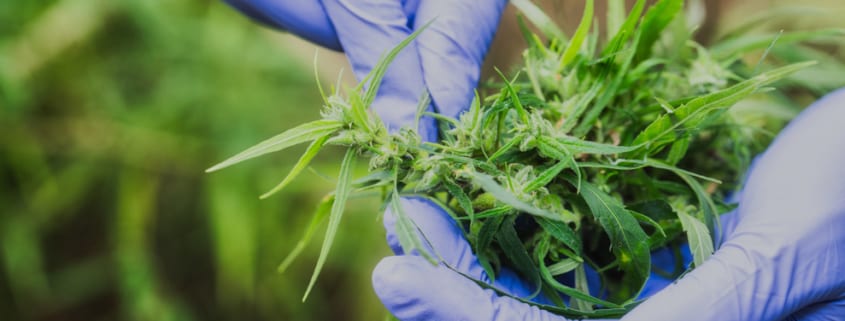The 2018 Farm Bill finally opened the doors to industrial hemp farming in the United States, but hemp farmers don’t get a free pass. Instead, the Farm Bill instituted strict hemp compliance requirements and also called on states to develop their own hemp testing and certification standards, which means the exact rules a farmer must follow depends on the state in which they grow their crop. Sound confusing? It can be. In this article, we’ll give you a rundown of the federal rules as well as our recommendation on best hemp compliance testing practices.On October 31, 2019 (yep, Halloween; take from that what you will), the USDA released the U.S. Domestic Hemp Production Program through an interim final rule. The purpose of the interim rule was to further explain federal hemp compliance standards until November 1, 2021, at which point the USDA will release its final rule.
In describing the interim final rule, HempGrower.com explains, “The 161-page document provides guidance on applying for licenses, sampling, tetrahydrocannabinol (THC) testing and interstate transit.” (Read the full interim final rule.)
The interim final rule says a lot about… well, a lot, but here’s what you need to know about compliance.
Hemp Compliance Testing Rules
Understanding the 2018 Farm Bill
In December 2018, President Trump signed the 2018 Farm Bill. This was no ordinary bill. Sure, it included a lot of the normal revisions and extensions to the country’s agricultural and nutritional policies, but it also featured a very special amendment that essentially legalized the production of industrial hemp in the United States.
At the same time, the 2018 Farm Bill implemented several important restrictions. The most important restriction is that industrial hemp cannot contain more than 0.3% THC. In order to ensure that hemp crops meet this standard, section 10113 of the bill empowered the department of agriculture in each state to create a hemp testing, compliance, and licensing plan that would then be submitted to the United States Department of Agriculture (USDA) for review and approval.
The Farm Bill specified that states don’t necessarily need to create their own plan. Farmers living in states without a state-specific regulatory program will be able to seek licensing from a federally-run program. By the end of 2019, 22 states and tribes had submitted plans for approval.
The 2018 Farm Bill helped spur the rise of hemp farming in America, but there are still many questions and gray areas related to how testing and compliance will work. To help clarify these questions, the USDA released an interim final hemp rule at the end of 2019.
The Interim Final Hemp Rule
States and tribes must collect samples from every lot of hemp that farmers plan to harvest. This is a stricter standard than some states had previously developed. (In those cases, states had opted for randomized testing rather than testing every lot.)
Additionally, states must conduct sampling 15 days before the anticipated harvest. This is an extremely important fact for farmers to keep in mind. This—15 days before harvest—is when your crop must be below 0.3% THC.
All samples must be collected by a USDA-approved sampling agent or a federal, state, or law enforcement agent. Samples will be taken from the top one-third flower portion of the plant, which, experienced hemp farmers will note, contains the highest levels of cannabinoids in the plant. Farmers will be expected to pay the sampling fees.
One of the most controversial aspects of the interim final rule has to do with the testing facilities. The rule specifies that hemp compliance testing must be completed by a DEA-registered lab. Farmers who were previously using third-party labs will need to switch over to compliant labs. These DEA-registered labs must test THC using post-decarboxylation (or a test that is similarly reliable) and must include the total amount of delta-9 THC and tetrahydrocannabinolic acid (THCA).
What Happens If Your Sample Exceeds Allowable THC Levels?
No farmer ever wants to consider the possibility that the THC level of their sample comes back too high. If this happens, the first line of defense is that a farmer can request a second round of testing if they believe the original result was made in error.
If that option doesn’t work and the sampling still comes back with too much THC, the entire hemp lot will be treated as marijuana, and the farmer will need to dispose of the crop according to the standards of the Drug Enforcement Administration.
If that weren’t bad enough, a hemp crop sample that tests above 0.5% THC will earn the farmer a Notice of Violation from the USDA, which will include a corrective action plan that the farmer will be required to follow. If a farmer racks up more than three violations over five years, they won’t be able to legally grow industrial hemp for the following five years. (Note, if a hemp crop is over 0.3% THC but below 0.5%, no violation will be assessed.)
Don’t let that happen! The best way to ensure that your hemp crop doesn’t run hot is to develop the right hemp testing protocols.
When to Perform Hemp Potency Testing
If you watch enough football, you’ll invariably hear the announcers proclaim, “The best offense is a good defense.” That same logic applies when it comes to hemp potency testing. Our suggestion is to test for THC early and often, starting when the plants are in the juvenile stage.
Ideally, after the first few weeks of flowering, you’ll want to begin testing your crop every week. This will help you monitor how quickly your THC levels are rising so you can take action if your crop starts to run hot. Be prepared for THC levels to rise quickly in the last few weeks before harvest. Also, remember that the new interim final rule requires samples to be taken 15 days before harvest. Don’t wait one day longer to test, as a few days could mean the difference between being in compliance or losing your entire crop!
How to Test Hemp
While the interim final rule requires that your samples be tested by a DEA-registered laboratory, you don’t have to choose the same lab for all of your hemp tests. If you plan to test your hemp crop throughout the flowering process, you may wish to use a third-party lab of your own choosing. Larger scale industrial hemp farmers may also choose to perform their own testing on site if they have the right equipment and materials.
Keep in mind that cannabinoid testing is only one of several tests you should consider performing on your crop to increase your chances of a successful harvest. It’s also a good idea to test your soil for pesticides and heavy metals before you plant your first hemp seeds. You’ll also want to consider testing your plants for contaminants, flavonoids, and terpenes after harvest so you can accurately represent your product to processors or customers.
Choosing the Right Hemp Seeds
One of the best ways to create a “good defense” when it comes to hemp compliance is to choose the right hemp seeds. You’ll want to look for seeds with strong, well-documented genetics that have a solid history of remaining in compliance. There are a lot of new seed companies coming onto the market, and all of them will claim to offer the best seeds. Search for seed companies that have been around for a while, that have worked with lots of farmers, and that have a good reputation within the industry.
Any hemp seed company worth their salt (or their seeds) should be happy to tell you about the testing they’ve done on their hemp seed strains to ensure their seeds stay in compliance.
Know Your State Rules
Last, but not least, we want to reiterate that it is imperative for farmers to look up the hemp testing and compliance rules within their own state. While all state programs must follow the federal rules, the state rules can be even stricter. Several states have drafted their own regulatory plans, and Florida officially launched its hemp program in January 2020. Check with your state’s department of agriculture to determine the specific rules of your state.
In the meantime, if you want hemp seed strains with a proven history of compliance, contact High Grade Hemp Seed today.



